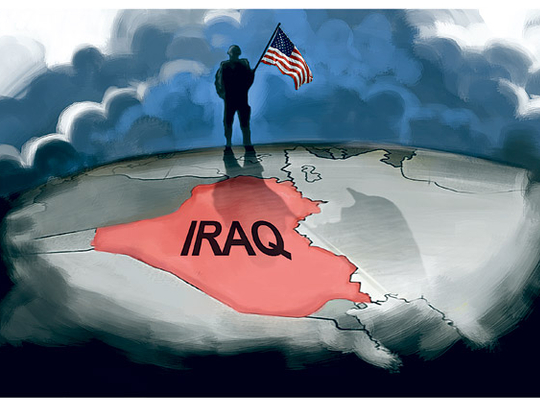
Entering a war is easy; getting out of it is the hard part. That axiom is particularly true for the United States today, as it muddles through three wars — two of which were forced upon it (Afghanistan and the "war on terror"), with the third (Iraq) started unnecessarily by a US administration blinded by ideology and hubris.
The US has no prospect of a military victory in Afghanistan or Iraq; these wars' economic costs can hardly be borne anymore, and political support at home is dwindling. America must withdraw, but the price — for the US, its allies in the region, and for the West — remains an open question.
The last US combat troops have pulled out of Iraq. Despite using all the means at its disposal, the world's greatest military power managed only to create a precarious domestic stability. No one today is hanging "Mission accomplished!" banners. None of the urgent political problems caused by US intervention — the distribution of power between Shiite and Sunni, between Kurds and Arabs, and between Bagdad and the regions — were actually resolved.
Iraq remains a state without a common nation. Moreover, it threatens to turn into a battleground for its neighbours' opposing interests. The struggle between Saudi Arabia and Iran for Arabian Gulf hegemony threatens to turn Iraq into a battlefield again, including another round of civil war. Neighbouring Syria and Turkey would probably be dragged into such a conflict instantaneously. One can only hope that the vacuum created by America's withdrawal doesn't implode in violence.
Complicated situation
The situation in Afghanistan is even more complicated. Afghanistan is the mirror image of Iraq: a nation without a state. Separatism was never a threat here, but ever since the Soviet invasion in 1979, the country has been a theatre of war for global and regional conflicts.
What we see in Afghanistan isn't just a civil war. Via their Afghan allies, Pakistan in particular but also Saudi Arabia, Iran, India, and Central Asian countries are embroiled in a fight for influence.
At first, the war in Afghanistan was a war of liberation against the Red Army; then it turned into a civil war, and from the mid-1990s it was subsumed in the Indian-Pakistani conflict, as Pakistan sought to achieve strategic depth and regional influence via the Taliban, a creation of the Pakistani secret service, the ISI. The terror attacks of September 11, 2001, turned Afghanistan into the theatre of a global war. But what will now follow? A relapse into regional war and terrorism? Or will developments take an unforeseeable turn?
The US and Nato are caught in a quandary in Afghanistan. They can neither remain in the country indefinitely, nor can they just leave. Indeed, it is forgotten all too often that the US de facto withdrew from the country once before, following the Soviet retreat of February 1989. Twelve years later, after the terrorist attacks of 2001, the US and its western allies had to return to fight Al Qaida and the Taliban, which had turned Afghanistan into a breeding ground of terrorism.
The lessons of the 1990's aren't difficult to understand and are too important to ignore. Apparently, though, some western officials are trying to do just that. The Europeans would prefer to withdraw sooner rather than later, and the US will probably follow suit. It is now apparent how great a mistake the US made by never developing a proper political strategy for Afghanistan, relying instead almost exclusively on military means. Indeed, the strategy for "Afghanisation" of the conflict by training local security forces — agreed upon at the beginning of this year at a conference in London — is based mainly on the US and European timetable for withdrawal, not on the situation within the country and in the region.
Main challenge
If the US and Nato leave Afghanistan to its own devices without first creating a minimum of regional stability, it is all but certain that the danger of fundamentalism will return in relatively short order, and will be greater than it was in the 1990's.
But regional stability primarily requires the clarification of Pakistan's role in Afghanistan. And the same challenge hides behind the formula of "inclusion of the Taliban" in any settlement for Afghanistan, because the Taliban have no bargaining power without Pakistan, as recent events have shown.
The key to Afghanistan lies in Islamabad, not in Kabul, which means that US President Barack Obama's special envoy for Afghanistan and Pakistan, Richard Holbrooke, is more important now than the military commander in Afghanistan, General David Petraeus. It is in Pakistan's capital that a regional solution will have to be negotiated, and the conditions for success are by no means hopeless, though it involves the far more complicated — and rarely mentioned — issue of Indian-Pakistani relations.
The West wants to withdraw from Afghanistan and will surely do so. The irony, however, is that withdrawal might lead the West into a new, far more dangerous regional war as Iran proceeds toward its goal of developing nuclear weapons. If that happens, withdrawal plans will be returned to the shelf — probably for many years.
— Project Syndicate









